How to enable the hidden, experimental, center-aligned version of YouTube

YouTube, like many other websites, undergoes changes, and it has taken on a number of guises over the years. Some looks have lasted for a long time, while others have been shorter lived. There are also experimental looks, not all of which end up being released, but even when a redesign is rolled out, it can take a while to make its way around the world. Currently in the experimental stage is a center-aligned layout which includes a cleaned up interface a new menu and a few other tweaks.
In the new design, a top navigation bar is now locked to the top of the screen, remaining in place while the rest of the page scrolls. There is a customizable carousel and a new Upload button encourages visitors into sharing. It's not yet clear quite when this new interface will be officially released to a waiting world, but it's something you can enable now; all it takes is a quick cookie tweak.
Jobs site offers Internet Explorer 7 users new computers with 'a modern browser' for free

When a site decides it will no longer support outdated versions of a certain browser, usually an announcement of some sort follows, explaining that affected users should upgrade to a newer iteration, or switch to an alternative offering, in order to avoid a subpar experience. For the most part, the targets are Internet Explorer 7 and its predecessor, both of which belong to the annals of browsers, even in Microsoft's opinion.
But, NursingJobs.us has decided to take a different route. In a blog post titled "IE7 users, we need to talk...", the jobs site has announced that it has stopped supporting the said browser version (that is now more than seven years old), but in order to keep affected users happy it will give them "a new computer with a modern browser" for free.
Internet Explorer wins browser battery battle

Microsoft is asking us to rethink our opinion of Internet Explorer in its latest marketing blitz, and those with a Windows 8.1 device have been given further food for thought on which browser to use.
Internet Explorer has been named the browser that will squeeze the most life out of your Windows 8.1 laptop or tablet battery in a head-to-head study.
The countdown is on -- Microsoft NORAD Santa tracker is about to go live

You likely realize that a rather big holiday is fast approaching, and the children are growing antsy. It's only a matter of time before the old guy in the red suit takes to the sky to pay a visit to each and every home. You've also perhaps heard that both Microsoft and Google have trackers up and running to keep you informed of reindeer progress.
The NORAD version, which could be thought of as the "official" one, as the organization has handled Santa duty since 1955, is now run by Microsoft. Thanks to time zones, it's also just about to go live.
Internet Explorer retains its grip on desktop browsing

The latest month-by-month figures from NetMarketShare show that Internet Explorer continues to be the most popular desktop browser. Indeed Microsoft's browser has increased its lead by around three percent since January and now has a 58.36 percent share of the market.
Next most popular is Firefox on 18.54 percent, down just over two percent from its 2013 peak in May. Chrome comes next, having been only half a percent behind Firefox in July it's now on 15.44 percent, two percent down on its January peak.
Internet Explorer 9 is no longer welcome in Google Apps

Microsoft, while not innovating at Mozilla-Google rate, has been stepping up development of Internet Explorer -- thankfully moving on from the dim, dark days of IE6. Windows 8.1 comes with the shiny new Internet Explorer 11, and with that release Google implements plans to begin phasing out version 9 of the browser.
Don't panic yet -- this move is for Google Apps, a service used more in the business realm than the home. It really should not come as a surprise, as the search giant holds firm to a policy of support for current and previous browser versions -- in other words IE 10 and 11 now.
Internet Explorer vastly superior at defeating social engineering attacks
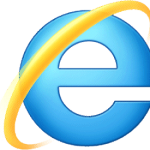
Security research firms frequently test browsers to see how good they are at protecting users from malware and phishing attacks. The results show you how secure (or otherwise) the latest versions are, but don't give you any real indication of how well they might perform in the future.
Identifying trends in performance is important, particularly for companies thinking of switching browsers, so NSS Labs evaluated the security of Internet Explorer, Chrome, Firefox and Safari by aggregating results from phishing and socially engineered malware (SEM) attack tests conducted between 2009 and 2013.
Maxthon arrives on Windows Phone 8, but can it really challenge Internet Explorer?
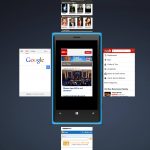
The name "Maxthon" likely evokes some memories for long-term Windows users. The browser, that was once known as MyIE 2, is among the oldest of its kind, having launched on Microsoft's OS more than a decade ago. It has never risen to the popularity of Chrome, Firefox or Internet Explorer, but it has been a perennial alternative ever since. To keep up with the changing computing landscape, the company behind Maxthon has also launched the browser on Android and iOS.
And, now, Maxthon arrives on Windows Phone 8 as well where, once again, its biggest rival is Microsoft's Internet Explorer, which the former has long struggled to surpass in market share. But, this time around, the balance can tip in Maxthon's favor as smartphone users are not as enamored with (or, better said, glued to) Internet Explorer as Windows PC users used to be. But there is one barrier to overcome: Maxthon has to clearly best Internet Explorer. And that may prove to be, once again, a difficult task.
Internet Explorer and Red Bull go mountain biking

Few places scream mountain biking louder than Utah. With locations like Canyonlands National Park, the entire state has become a mecca for thrill seekers, and served as the backdrop for the real-life situation that became the movie 127 Hours. Red Bull, famous for its energy drink and its sponsorship of sports, uses the state to stage its Rampage mountain bike challenge.
The event, which took place October 11-13 in Virgin, Utah, was streamed live online and will be shown on NBC December 21st in the US. However, Red Bull is also partnering with Microsoft's Internet Explorer to bring it to you sooner.
Stop! Microsoft releases Internet Explorer 11 Blocker Toolkit
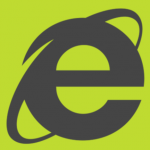
So… you don’t want Internet Explorer 11 in Windows 7, eh? What are you going to do? Block it! Ahead of the release of the completed version of IE11, Microsoft is giving Windows 7 users the chance to avoid automatically updating. The Internet Explorer 11 Blocker Toolkit can be used to prevent the web browser from being pushed as an "important" update when it is released.
IE11 comes as an integral part of Windows 8.1 (Windows 8 users can currently only get it by upgrading) and a Release Preview of the browser was made available for Windows 7 three weeks ago. There's no official word on when the finished version of IE11 for Windows 7 will see the light of day, but it's likely to be fairly soon.
Internet Explorer spellchecker Speckie adds support for IE11, improves touch
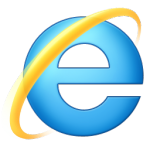
Versoworks has released Speckie 6.0, a major new version of its real-time spellchecking tool for Internet Explorer. The software, available free for personal use as well as in commercial form with additional features, adds support for the forthcoming Internet Explorer 11 with this new release.
Version 6.0 also comes with the promise of improved support for Rich Editors, and has updated the Settings user interface to be more amenable to touch-screen interfaces, despite the fact it doesn’t yet support 64-bit versions of Windows 8 or Windows 8.1.
Internet Explorer at 18 -- Microsoft's web browser comes of age

It's a big day in anyone's life -- turning 18. The strike of the clock at midnight opens up a world of opportunity that simply did not exist before. Things may not be quite so dramatic in the life of a web browser (they can't vote, for starters), but today is a big day for Internet Explorer nonetheless; today marks the 18th anniversary of the release of Microsoft's much loved and hated browser. There's something of a nostalgia-fest underway at IE's Facebook page!
Whichever side of the fence you fall on, there's no denying that Internet Explorer has been, and continues to be, an incredibly important tool in opening up the Internet to a wider audience. Usage figures may not be quite as high as they were back in the heady days at the turn of the century when there was slightly less competition in the market, but IE continues to do well -- amazingly well considering the criticism and ridicule often levelled at it.
Internet Explorer remains three of the top five web browsers
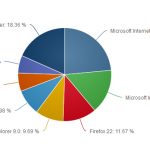
Internet Explorer might no longer hold 96 percent of the browser market like it did back in 2002, but Microsoft’s browser still remains hugely popular. Firefox and Chrome took large bites out of IE’s dominance, but they have yet to topple it, and don’t look set to do so any time soon.
According to new figures from Net Applications, Internet Explorer 8 is the most popular browser on the desktop with 23.52 percent global market share. And it’s not the only incarnation of IE in the top five either.
Microsoft's modern.IE scanning tool goes open source

Microsoft rolled out Internet Explorer 11 Preview for Windows 7 and Windows Server 2008 R2 yesterday, and also updated modern.IE -- a set of tools and resources designed to make developing for the browser just a little bit easier.
The software giant additionally announced that the modern.IE scanner, which analyzes the HTML, CSS, and JavaScript of a site or application looking for common coding issues, is now open source (under Apache 2.0 license) and available to download from GitHub.
Internet Explorer has the worst phishing catch rate of all major browsers

A new report by security research firm NSS Labs looks at the comparative performance of popular browsers when it comes to blocking phishing attacks. Over a 12-day test period the average phishing catch rate ranged from 96 percent for Firefox 19 to only 83 percent for Internet Explorer 10.
Of the other big three, Chrome 25 scored 92 percent, Safari 5 managed 95 percent, and Opera 12 scored 89 percent. Chrome, Firefox and Safari all make use of Google's Safe Browsing API so it's unsurprising that they scored within a few points of each other. Microsoft uses its own SmartScreen technology in IE, whereas Opera uses a combination of blacklists from Netcraft, PhishTank and TRUSTe.
Recent Headlines
Most Commented Stories
BetaNews, your source for breaking tech news, reviews, and in-depth reporting since 1998.
Regional iGaming Content
© 1998-2025 BetaNews, Inc. All Rights Reserved. About Us - Privacy Policy - Cookie Policy - Sitemap.